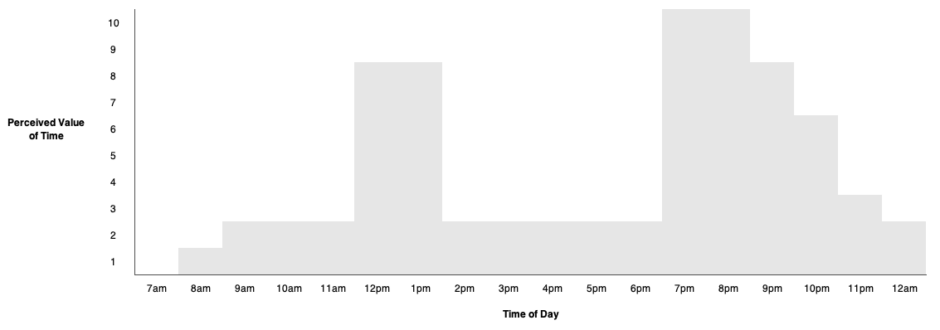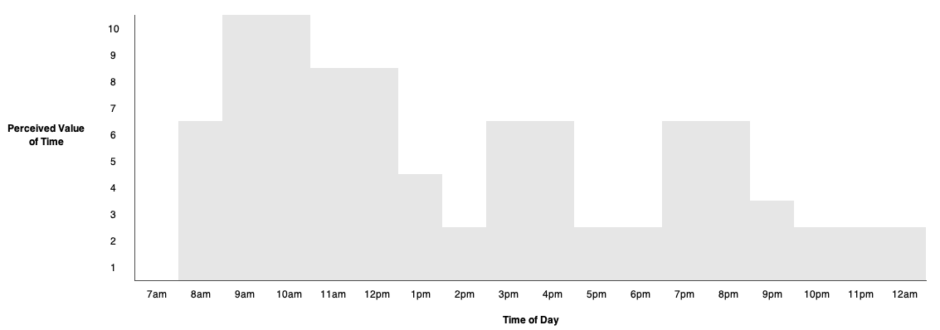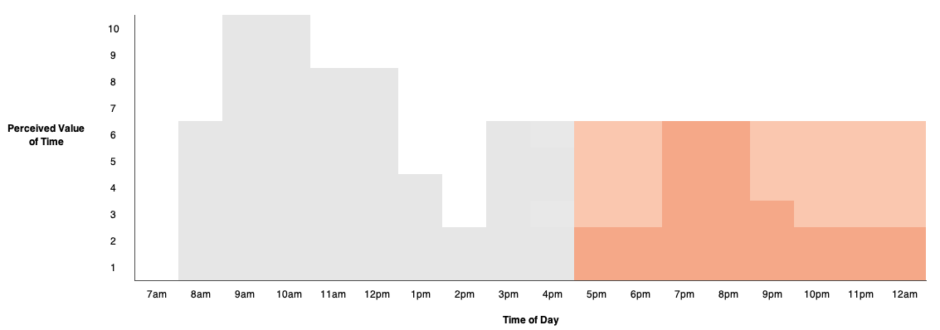How My Career Break Changed the Way I Value Time
Last week, I got on the train in the morning on a weekday to meet a friend for breakfast. Once I stepped into the train, I could remember vividly the morning rush hour when I hated when I was in full-time employment. Packed like sardines in the train, I would find myself listening to podcasts, counting down the minutes until I can escape. Now, my mornings are a world apart, filled with peaceful walks and leisurely breakfasts. This career break has changed how I value my time these days.
Let’s explore the concept of time and its value in this article.
Every week, I’ll be sharing practical tips and invaluable knowledge to guide you on your path to financial independence.
How We Value Time as Employees
As employees, we often find ourselves valuing time based primarily on our work hours. The structure of a typical workday dictates how we allocate the hours of our days based on work commitments, often leaving little room for personal flexibility or fulfilment. The traditional 9-to-5 work schedule imposes a rigid structure on our daily lives.
Our mornings are spent commuting and preparing for the workday, while the core hours from 9 am to 5 pm are dedicated entirely to job responsibilities. This structured approach often means that our most productive hours are consumed by work tasks, leaving personal interests and relaxation to the fringes of the day.
As a result, we perceive our time to be extremely valuable during the hours where we are not at work. For example, I cherish my lunch hours every work day because it is an hour that I am allowed off the hamster wheel. After lunch, we look forward to the time we can knock off work where we finally get off the hamster wheel for the rest of the day. It’s really not too different from being in jail, except our prison has a nicer name–workplace and we get to choose our meals.
Here’s a chart that shows how I valued my time as an employee. I believe it’d be the same for most employees (write in the comments section below if you think differently).
The Psychological Shift in Valuing Time
The transition from structured workdays to the flexibility of a career break has significantly altered how I value my time. Taking a career break allowed me to discover the different parts of the day that I truly value, along with the reasons why they are of high value to me.
The freedom to choose my activities based on personal interests has provided a sense of control and satisfaction that was often missing during my working years. The flexibility of my schedule now means I can prioritise what truly matters to me.
Starting My Day with a Productive Morning
The freedom to structure my day around fulfilling activities has enhanced my mindfulness and overall well-being. I am more present and appreciative of each moment, leading to a healthier, more balanced lifestyle. In the first 2 months of my career break, I discovered that I enjoy starting my day with a peaceful morning walk from 8-9am while listening to podcast. I stacked this morning habit with a proper breakfast and an hour of book reading.
This routine has become my favourite part of the day because not only have I clocked my 30 minutes of daily activity and have achieved some form of productivity and personal development. My mornings now hold an exceptionally high value in my day.
Reigniting the Joy of Cooking
I find enjoyment in cooking, but I don’t do a lot of it when I was employed because I don’t enjoy it enough to wake up early just to cook and there’s very little time to do any cooking after I return home from work. These days, I have the freedom to try a new recipe and have a late lunch at around 2-3pm. I found that I enjoy cooking lunches over dinner so although I choose to cook my lunch, I would still buy food from one of the coffeeshops in my neighbourhood for dinner.
Happiness has now replaced employment constraints as a primary factor in how I value my time. Engaging in activities that I enjoy, such as cooking, reading and walking, has brought a new level of satisfaction and well-being.
Here’s a revised chart of how I value my time now with my new found freedom.
The biggest change we can see from both charts, is that given the freedom to choose, I find joy doing activities that I enjoy in the first half of the day. The second half of the day holds lower value for me because all the happy things are already done and the remaining half is free for me to do anything I want, such as running errands or watching videos on YouTube.
One may argue that I could make better use of my afternoons and evenings. But I find that I don’t have that many joyful activities to do every day. I recently bought a Golden Village Annual Pass that allows me to watch 16 movies at $7 a ticket and enjoy discounted Regular Popcorn Combo or Nachos Combo at $7. That will allow me to enjoy affordable movies in cinemas whenever I crave for it.
Not All Hours Are Equal
An important realisation during my career break was that not all hours are valued equally. The time I spend on activities I cherish, like my morning routine, is incredibly precious. If someone wanted me to dedicate this time to work, the “price” that I would attach to doing work at this time should be much higher.
Conversely, time that I value less, like the afternoons where I relax and watch TV, could be priced lower if exchanged for work. This differentiation in time value is a way for me to help better think about personal time and professional/relationship commitments. It also made me think about accepting part-time or fractional work on low-value hours during my career break.
Prioritising High-Value Time
Understanding that certain periods of the day are more valuable helps in planning and prioritising. High-value time should be reserved for activities that bring the most joy and satisfaction, or for tasks that require high levels of focus and productivity. Ideally, I would not want to sell my high-value time for money and if someone really wants those hours, they will have to pay a higher price for it.
In fact, I would create and fine-tune routines and/or stack other habits to achieve an even better outcome. Here’s what I did.
I started with morning walks = wellness.
Then it became morning walks + breakfast = wellness x enjoyment.
Then I stacked morning walks + breakfast + reading = wellness x enjoyment x personal growth.
And I amplified the routine with morning walks + breakfast + reading + blogging = wellness x enjoyment x personal growth x fulfilment.
Should I Monetise Low-Value Time?
On the same point about charging higher for high-value time, I’m also thinking if it also means that I should be monetising low-value time because the activities done during that time doesn’t “spark joy” and does not incur unhappiness if I didn’t do them. Since these hours are of low value to me, I think that I would probably be okay with doing some work in exchange for a fraction of what I am typically paid per hour in my last employment.
The obvious challenge would be matching my skills with work that pays a decent amount of money and allows me to work remotely. I am exploring a few options now and will share with you when I have something concrete to share.
Adding New Activities: How to Make Blogging Fun Again
Recently, a friend commented on the amount of time I spend writing my blog, suggesting it seemed intense and more like work than a break. As the self-appointed “career break police,” he concluded that I might not truly be on a career break. His observation was an interesting one and made me reflect on blogging as an activity during my career break because I tend to take things to an extreme and overdo them (as my friends would know).
Regular readers would realise that I restarted my blogging cadence, posting a new article every Wednesday. I think I have gotten a hang of the routine where writing a blog doesn’t feel like work to me. It’s a creative outlet that allows me to express my thoughts, share experiences, and connect with others. I also find that blogging gives me a platform to reflect on something I experienced the week before, or learnings from a book that I’ve read, and share them with a broader audience.
Because I use a mixture of high-value and low-value hours to write parts of the article over the week so it feels neither tedious nor rushed. It is also a way for me to feel that I have been productive for the week because there is a visible output that comes in the form of a published article. My reward for blogging comes in the form of reading and responding to comments from my readers.
It was a good reflection because I do intend to add more activities into my high-value time and possibly low-value time, like going back to the gym and getting more swims in the pool. It’s just about figuring out how I can insert them into my daily/weekly routine without negatively impacting happiness.
Practical Implications and Reflections About Career Breaks
Taking a career break has provided me with valuable insights into how I manage and value my time. The ISTJ in me continues to over-analyse things but the benefit of overthinking allows me to conceptualise and breakdown my reflections into 3 broad ideas.
Value Our Time on Our Own Terms
We often let others determine when is the most valuable part of our time. The most common scenario we encounter is employers who decide when your time should be spent on work, in exchange for money. But if we step away from it all and look at it from within, do you know what are the hours of your day that truly matter most. What are we doing to protect those high-value hours from disruptions? Are we being paid adequately for those high-value hours? Should we monetise our low-value hours instead?
Redefining Work and Breaks
The traditional notion of a career break often involves completely stepping away from any productive activity. However, I find this view limiting because there can be so much more we could be doing during this time. My take is that a career break is about finding balance and engaging in activities that restore and rejuvenate you. For some, that might mean complete rest; for others, it involves engaging in fulfilling projects at a pace that suits them.
If we manage to strike the right balance between work and breaks, is there a need for society to have have distinctions such as weekdays and weekends to tell us when is the time to work and rest? If I reference my chart below, what’s stopping us from performing work activities for 7 days a week if we are able to achieve adequate portions of rest/joy for 7 days a week?
Adopt a Macro View as Well
While this article may seem portray a micro view on how we should perceive the value of time, it is equally important to adopt a macro view that considers our broader life circumstances and long-term goals. The only reason why I have not elaborated in details is because everyone have very differing life circumstances and long-term goals so our macro views should be personalised to our needs.
Having stayed home for the past 6 months, I recognised the need to be more physically present as a primary caregiver to my mum instead of just taking care of her financial needs. Because of this, I have a preference for a job that allows me to work fully remotely instead of one that requires being physically on-site. For others, it could be wanting to spend more time with their children during their younger years.
Looking at the bigger picture allows us to evaluate how our daily activities align with our life aspirations. This broader perspective can help ensure that we’re not just efficiently managing our time but also effectively steering our lives towards our ultimate goals.
Do you have a different opinion of how we should value our time? Leave your thoughts in the comment section below.




